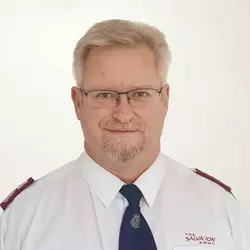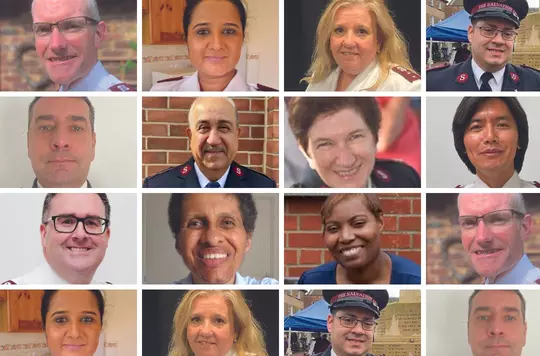8 February 2025
Romans 14: Growing in acceptance
Major Kingsley Layton
Major Kingsley Layton reminds us that we desperately need each other.
Key text
Last year I watched a documentary entitled What We Left Behind: Looking Back at Star Trek: Deep Space Nine. The storyline for the sci-fi series shifted focus from a starship flying from situation to situation to events occurring on the almost static space station, Deep Space Nine. Initially criticised, some 30 years on the show now receives stellar reviews.
How so? Well, the crews in previous incarnations of the show didn’t stick around to see what became of their hopeful solutions to the problems they encountered. The crew of Deep Space Nine, however, had nowhere to run. They had to live with their solutions. The community had to learn to accept the views and nuances that a diverse universe brought their way. This didn’t mean broad-mindedness but it did mean learning to accept what everyone brought to the galactic table.
In Romans 14, Paul addresses the handling of different cultures and views, including dining habits. He begins with ‘accept the one whose faith is weak, without quarrelling over disputable matters’ (v1). In the Greek, ‘accept’ means to draw in. There’s no air of resignation here. To draw somebody in is quite different from putting up with them.
Pause and reflect
- Can you name two things in contemporary corps that might arouse differences of opinion?
- How might opposing views be reconciled?
Paul continues: ‘One person’s faith allows them to eat anything, but another, whose faith is weak, eats only vegetables’ (v2).
On the surface, since Paul is talking about biblical dietary laws, it looks like the problem is food. These laws were given for very good reasons. It enabled Israel to maintain their national identity. It kept them from being assimilated by the culture of neighbouring nations. They were also a reminder that God could not be approached any old way – worshippers needed to be clean.
Today, of course, if we have faith in Christ, we are clean. Christ makes us clean. We don’t cleanse ourselves by cleaning up our morals or our behaviours or by treating certain foods as unclean.
Pause and reflect
- Reflect on these lyrics from ‘It Is Finished’ by James Proctor: 'Cast your deadly ‘doing’ down,/ Down at Jesus’ feet;/ Stand in him, in him alone,/ Gloriously complete.'
Throughout his letter, Paul observes that there are some people in the Roman church who are still trying to obey the Mosaic Law. He addresses the relationship between Jews and the Law (see Romans 2:17–29) and the relationship between faith and the Law (see Romans 4).
Paul doesn’t say that such people are wrong, he calls them ‘weak’ (v1) – weak in their understanding of the gospel and what it means to be in Christ.
Pause and reflect
- When you find a sermon challenging, who ‘wins’? You or the Bible?
As you read Romans 14, you might already be calling to mind 1 Corinthians 8. In that passage, Paul talks about food offered to idols. In Corinth, the markets would have their food ritually blessed by pagan priests early in the morning before consumers entered the scene. As a result, some members of the church in Corinth were stipulating that there’s no way that meat blessed on behalf of idols should be eaten. The ‘weak’ ones here were not the Jews: it was likely the Gentile pagan converts who were objecting. They were the ones whose ‘faith is weak’ in understanding what it means to be in Christ, because they felt these gods might still have some sort of power.
Essentially, this is not an issue about food. It’s about different cultural approaches to how to live. Racial prejudices are at work.
I am often blind to my own racial prejudices. When Christians from other cultures do things differently from us, what do we think or say? Maybe we think: ‘How lovely. Isn’t that interesting?’ But when we do something, do we think of it as just the way something is done? Are we more likely to entertain thoughts of it being the ‘right’ way?
Pause and reflect
- Reflect on something you admire about a culture other than your own.
I have a friend called Buchi, who is Nigerian. A while ago, he said to me: ‘Pastor K, we like to think that perhaps David was African.’ Buchi knows his Bible better than many. He was not actually claiming African heritage for David but referring to David’s love of song and dance. Whenever I feel that our theological conversations might be touching on his potential prejudices, Buchi draws on corroborating Scripture with which I must banish my own prejudices.
Every racial culture needs to be corrected by the gospel somewhere and every racial culture has particular insights to gospel implications – they can see aspects of God’s truth that other cultures either can’t see as well or can’t see how they once could. In short, we need each other. We need each other desperately.
In The Four Loves, CS Lewis talks about three dear friends, Jack, Ronald and Charles. Charles dies and Jack thinks: ‘Well, as sad as that is, at least I still have Ronald. In fact, I’ll probably have more of Ronald. I won’t have to share Ronald with Charles.’ To his surprise, Lewis discovers that when he loses Charles, he loses a part of Ronald that only Charles brought out.
Star Trek: Deep Space Nine reminds us that it takes a universe of differences for a community to succeed. The startling beauty of Jesus is that he died for each and every one of us, that we might all be clean before an almighty God who made all things well.
Bible study by

Major Kingsley Layton
Corps Officer, Risca
Discover more

Lieut-Colonel Karen Shakespeare considers how harmony reveals the richness of God’s Kingdom.

As the Week of Prayer for Christian Unity invites us to consider racial injustice, Lieutenant Nazia Yousaf encourages us to be inclusive.

The UKI Territory’s team of intercultural mission officers introduce themselves.

Commissioner Gillian Cotterill encourages us to follow the good Samaritan’s example.
